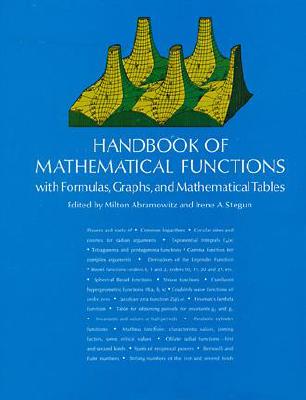
Despite the increasing use of computers, the basic need for mathematical tables continues. Tables serve a vital role in preliminary surveys of problems before programming for machine operation, and they are indispensable to thousands of engineers and scientists without access to machines. Because of automatic computers, however, and because of recent scientific advances, a greater variety of functions and a higher accuracy of tabulation than have been available until now are required.
In 1954, a conference on mathematical tables, sponsored by M.I.T. and the National Science Foundation, met to discuss a modernization and extension of Jahnke and Emde's classical tables of functions. This volume, published 10 years later by the U.S. Department of Commerce, is the result. Designed to include a maximum of information and to meet the needs of scientists in all fields, it is a monumental piece of work, a comprehensive and self-contained summary of the mathematical functions that arise in physical and engineering problems.
The book contains 29 sets of tables, some to as high as 20 places: mathematical constants; physical constants and conversion factors (6 tables); exponential integral and related functions (7); error function and Fresnel integrals (12); Bessel functions of integer (12) and fractional (13) order; integrals of Bessel functions (2); Struve and related functions (2); confluent hypergeometric functions (2); Coulomb wave functions (2); hypergeometric functions; Jacobian elliptic and theta functions (2); elliptic integrals {9); Weierstrass elliptic and related functions; parabolic cylinder functions {3); Mathieu functions (2); spheroidal wave functions (5); orthogonal polynomials (13); combinatorial analysis (9); numerical interpolation, differentiation and integration (11); probability functions (ll); scales of notation (6); miscellaneous functions (9); Laplace transforms (2); and others.
Each of these sections is prefaced by a list of related formulas and graphs: differential equations, series expansions, special functions, and other basic relations. These constitute an unusually valuable reference work in themselves. The prefatory material also includes an explanation of the numerical methods involved in using the tables that follow and a bibliography. Numerical examples illustrate the use of each table and explain the computation of function values which lie outside its range, while the editors' introduction describes higher-order interpolation procedures. Well over100 figures illustrate the text.
In all, this is one of the most ambitious and useful books of its type ever published, an essential aid in all scientific and engineering research, problem solving, experimentation and field work. This low-cost edition contains every page of the original government publication.







